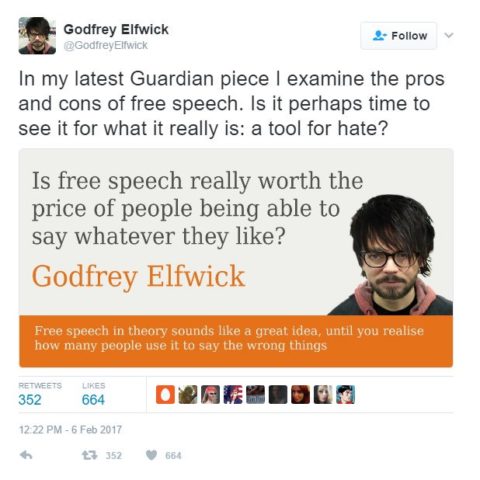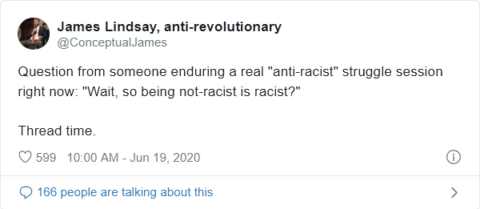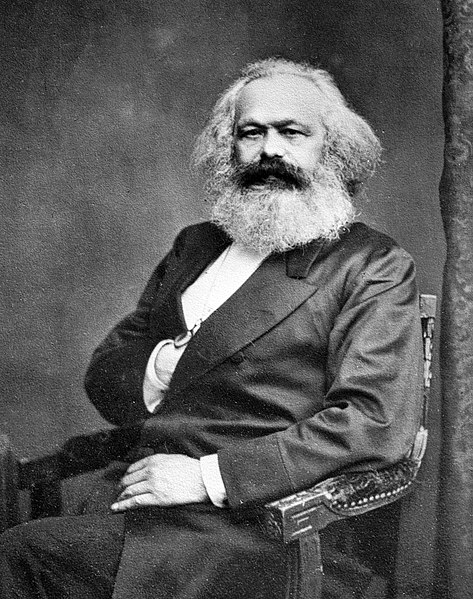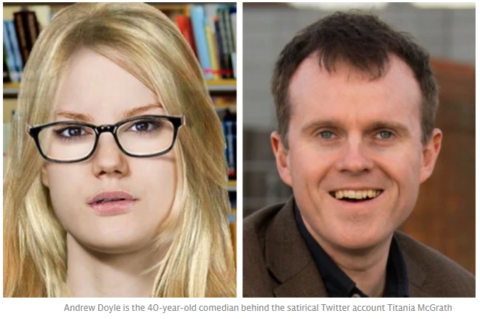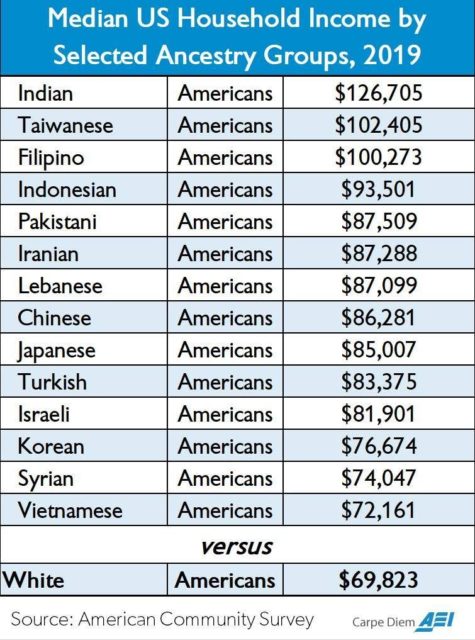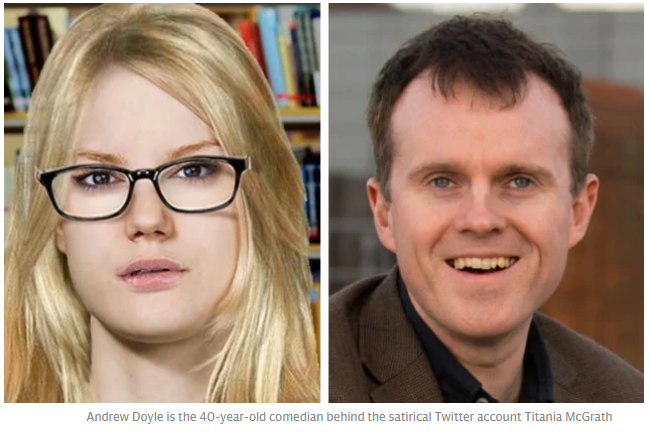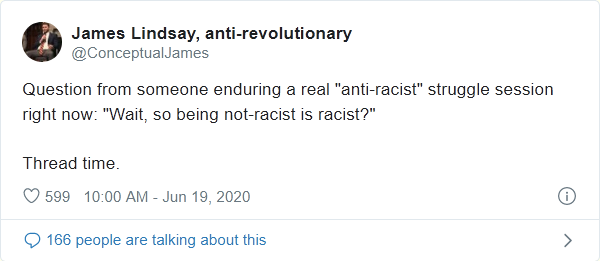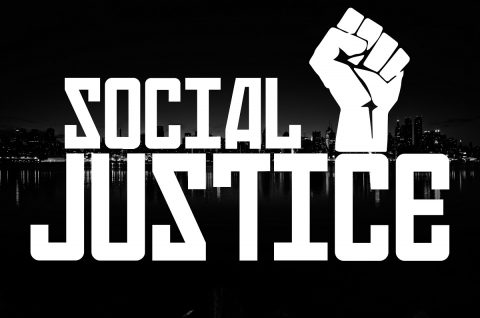The strange figures known as Wokists currently destroying America aren’t just reprises of earlier enemies. They represent something rather new. The political cult of Wokism combines the worst aspects of every political cult in history.
Whether they realize it or not, Wokists themselves combine the lunatic loyalty of the Manson family with the hollow pseudo-joy of Jonestown residents, the racism of National Socialists, the inhumanity of Mao Tse-Tung, the bratty tantrums of Veruca Salt, the nihilism of Bakunin-style anarchists, the totalitarianism of Stalin’s Soviet Union, the child torture and sacrifice of the Mayans, the derangement of Heaven’s Gate followers, the sadistic violence of the Jacobins, and the ruthless control-freakism of the current Chinese Communist Party.
Now add to that noxious syncretic blend the Wokist use of powerful communication technologies to shape narratives and meta-narratives, destroy opponents, and recruit new converts, and you’ve got yourself a thing.
Through it all, a counterfeit moral imperative with a deceptively appealing name (“social justice”) drives the cult. That counterfeit imperative casts all existence as one great battle between Good (Wokism) and Evil (everything that is not Woke). It denies any constraints on efforts to win that battle. It entails an obsessive totalitarianism. It forbids critical self-examination of itself. Adherents of the cult are Knowers of the One True Truth. They are crusaders in righteous battle. Only victory matters. Anyone so much as questioning the One True Truth, inside or out, must be destroyed.
Tal Bachman, “We Have Met the Enemy”, Steyn Online, 2021-04-06.
July 9, 2021
QotD: Woke fanaticism
June 26, 2021
QotD: Surfing the waves of resentment as a political career
Those who, for political reasons, keep past oppression or crime constantly before the mind of the descendants of the victims (that is to say, descendants of the victim group, not necessarily of the individual victims) help to foment and foster a deep mistrust or resentment that is no longer justified, but which can lead people in effect to cut off their noses to spite their faces.
This is to the great advantage of political entrepreneurs who surf resentment as surfers ride waves in Hawaii; and such resentment, the most damaging of all emotions, can easily become a self-reinforcing loop. It is not that past oppression or crime should be forgotten, much less denied, but that past achievements and change for the better must also be recognised, lest oppression and crime come to occupy minds entirely and distort decisions.
It is the same with injustice. It is important to oppose injustice, but just as important not to see it everywhere. To ascribe everything that you think undesirable to injustice may blind you to its real causes.
Theodore Dalrymple, “History and Self-Perpetuating Resentment”, The Iconoclast, 2021-03-20.
June 24, 2021
“[M]any of the woke genuinely do not understand why anyone finds their politics, or their political tactics, threatening”
In The Line, Joseph Heath tries to explain why many adherents of the wokist ideology fail to understand why anyone could possibly be against their policies or their tactics:
After several years of creeping illiberalism under the guise of progressive politics, American liberals are finally getting their act together. They are pushing back, creating several organizations committed to combating the influence of “woke” politics and ideology. They have momentum, not just because many woke mantras like “defund the police” have proven spectacularly unpopular, but also because there is genuine growing alarm about the intolerant and authoritarian brand of politics that has become associated with the woke left.
Unfortunately, many of the woke genuinely do not understand why anyone finds their politics, or their political tactics, threatening. In particular, the accusation that they are being authoritarian, or that “cancel culture” is a threat to freedom of expression, is one that they are simply unable to process.
There is a reason for this — and one that’s worth understanding. There are several key phrases that play an enormously important role in woke politics (e.g. “safety”, “mental health”, “microaggression”, “bullying” and even “human rights”) which they use to deflect the accusation of authoritarianism. If you adopt the right words, it’s easier to convince yourself that you’re the good guys even as you’re acting like the bad ones.
I want to take a shot at explaining how this works.
The most important thing to understand about woke politics is that it is not a conventional form of illiberalism, it is better thought of as a type of “illiberal liberalism”. It involves making a set of political demands that are fundamentally illiberal, but then articulating them in a way that fits the conventional structure of liberal political discourse. Because of the way that their complaints are packaged, the woke are able to brush off criticism of their tactics.
Take an issue like freedom of speech. There are various versions of this traditionally liberal virtue; predominant among them, is that those who hold this belief are opposed to content-based restrictions on speech. In the old days, lots of politicians didn’t really believe in freedom of speech, as many among the ruling class maintained straightforwardly illiberal views.
June 6, 2021
Decoding NPR’s revised approach to reporting in a social justice age
At Ace of Spades H.Q., K.T. listens to some NPR broadcasts (so you don’t have to) including an insight into how NPR and probably other media organizations are changing how they report the news:
We Hold These Truths: How Newsroom Leaders Wrestled With Covering A Tumultuous Year
This was sort of a panel discussion (light on the “discussion”), with commentary on things like how social media pressured newsrooms, for example, to say that “police murdered George Floyd” rather than “George Floyd died”.
But I kind of homed in on an academic phrase that bothers me. Sara Just from PBS:
Yeah, I think that you’re absolutely right. There’s been a deeper understanding and deeper conversation about how much our lived experiences play into the reporting that we do. And there’s no question that it does for each and every one of us in different ways. And I think that lived experience we especially highlight now is valuable, whether it’s race or gender or the challenges. I don’t think people with those lived experiences have to carry the burden, though, of being the only ones to report on it by any means. And so that’s something that we are always balancing. (emphases mine)
So, are they balancing whether or not people without “lived experiences” can report on issues involving “lived experiences”? Like Lori Lightfoot deciding she would only do one-on-one interviews with journalists of color? Will white people be allowed to report on stories involving black people? Will men be allowed to report on stories involving women?
This is partly about local sources, but it is largely about people thought of as being in “oppressed groups”. This panel is informing us that news reporting will now be filtered through the language and perspective of Critical Social Justice, whether we realize it or not.
The indispensable Translations from the Woke at New Discourses provides the following information on Lived Experience:
In the Theory of Critical Social Justice, for what turn out to be surprisingly deep and philosophically (almost) sophisticated reasons, lived experience is the overwhelmingly primary way in which knowledge can be obtained. This should not be mistaken to mean one’s firsthand experience, which most of us already recognize to provide a rather weak claim upon knowledge, though it is both implied and claimed that this is what “lived experience” refers to in Critical Social Justice. Lived experience, as Critical Social Justice uses the term, refers more specifically to one’s life experiences in allegedly systemic power dynamics of dominance and oppression that shape society structurally as understood with a critical consciousness and interpreted through Theory. That is, one’s “lived experience” refers to the interpretation that Critical Social Justice Theory gives for the anecdotal accounts of experiences one has had.
Because “lived experience” refers to an interpretation through Theory, it is only the “lived experience of oppression,” as Theory will have it, that counts …
It appears that you can’t really understand the reporting on PBS, and probably NPR, now unless you have studied Critical Social Justice.
Certainly, the claimed “lived experience” of members of dominant groups cannot be in any way used to challenge or dispute the assertions of Theory or those claiming to speak from it …
This restriction extends to members of “minoritized” groups who disagree with Theory as well — Theory cannot be authentically disagreed with. One might think that the lived experience of a member of oppressed groups would be admissible as a valid challenge to the claims of Theory, but this not so. They may be talking about their own experiences in life, but they aren’t appealing to lived experience, which must comport with Theory …
This is all very confusing and appears to be exactly what it is — a form of manipulating knowledge and epistemology as a means of asserting power and rigging the system such that those assertions of power cannot be challenged. Nevertheless, it isn’t merely an application of power and has a rather interesting and deep philosophical explanation that must be understood to understand why “lived experience” holds the status that it does and why it must comport with Theory to be granted veridical status and epistemic weight. This has everything to do with the fact that the roots of Critical Social Justice are in critical theories and, especially, postmodern philosophy.
There is much more, but it is way too deep to include here.
The NPR panel goes on to discuss new understandings of “balance” and “objectivity”. They do not intend to be objective. “Balance” will mean something different than what it has meant in the past in the news business.
Many people have found the way that TV news shows report on events since 2016 to be rather different than what they’d been used to before that. Some changes are subtle and others are quite blatant and hard to ignore unless you already agree with the viewpoint of the presenter. TV news used to at least pretend to present the news objectively but from the start of the Trump presidency most media outlets abruptly changed from a pseudo-objective (but leaning progressive) to an outright full-on progressive stance from start to finish with little or no attempt to provide other points of view for balance.
April 25, 2021
They don’t call it “neo-Marxism”, but that’s what Critical Race Theory really is
In City Journal, Christopher Rufo explains why Critical Race Theory is a natural child of orthodox Marxist thought:
Critical race theory is an academic discipline, formulated in the 1990s and built on the intellectual framework of identity-based Marxism. Relegated for many years to universities and obscure academic journals, it has increasingly become the default ideology in our public institutions over the past decade. It has been injected into government agencies, public school systems, teacher training programs, and corporate human-resources departments, in the form of diversity-training programs, human-resources modules, public-policy frameworks, and school curricula.
Its supporters deploy a series of euphemisms to describe critical race theory, including “equity,” “social justice,” “diversity and inclusion,” and “culturally responsive teaching.” Critical race theorists, masters of language construction, realize that “neo-Marxism” would be a hard sell. Equity, on the other hand, sounds non-threatening and is easily confused with the American principle of equality. But the distinction is vast and important. Indeed, critical race theorists explicitly reject equality — the principle proclaimed in the Declaration of Independence, defended in the Civil War, and codified into law with the Fourteenth and Fifteenth Amendments, the Civil Rights Act of 1964, and the Voting Rights Act of 1965. To them, equality represents “mere nondiscrimination” and provides “camouflage” for white supremacy, patriarchy, and oppression.
In contrast to equality, equity as defined and promoted by critical race theorists is little more than reformulated Marxism. In the name of equity, UCLA law professor and critical race theorist Cheryl Harris has proposed suspending private property rights, seizing land and wealth, and redistributing them along racial lines. Critical race guru Ibram X. Kendi, who directs the Center for Antiracist Research at Boston University, has proposed the creation of a federal Department of Antiracism. This department would be independent of (i.e., unaccountable to) the elected branches of government, and would have the power to nullify, veto, or abolish any law at any level of government and curtail the speech of political leaders and others deemed insufficiently “antiracist.”
One practical result of the creation of such a department would be the overthrow of capitalism, since, according to Kendi, “In order to truly be antiracist, you also have to truly be anti-capitalist.” In other words, identity is the means; Marxism is the end.
An equity-based form of government would mean the end not only of private property but also of individual rights, equality under the law, federalism, and freedom of speech. These would be replaced by race-based redistribution of wealth, group-based rights, active discrimination, and omnipotent bureaucratic authority. Historically, the accusation of “anti-Americanism” has been overused. But in this case, it’s not a matter of interpretation: critical race theory prescribes a revolutionary program that would overturn the principles of the Declaration and destroy the remaining structure of the Constitution.
April 16, 2021
The continued evolution of the Marxist class struggle – “Goodbye the working class, hello to the wokeing class”
Arthur Chrenkoff provides some background on the evolution of Marxist thought as they abandon efforts to rouse the working classes of the west against their capitalist oppressors and switch to attempting to rouse the “wokeing class” against their deplorable racist, homophobic, transphobic, sexist white male cisgendered oppressors:
In developing his philosophy, Karl Marx posited human history as a struggle of two sections of society: the minority who hold the all power and the powerless majority. In Marx’s time, the minority was termed the capitalist class, the bourgeoisie, or simply The Capital, those controlling (owning and benefitting from) the means of production, while the majority was called the working class, or the proletariat, the masses who sell their labour, and whose collective toil makes the capitalists rich. The essential dynamic of a society is one of power: who has it and who doesn’t, and how it’s exercised (or as Lenin said, “who whom?”). It’s a zero sum equation: all or nothing, the one or the other, the powerful and the powerless, the oppressors and the oppressed. There is a moral dimension to this dichotomy: the former, by virtue of their position, are the villains, the latter the virtuous. It’s also absolutist: the individual doesn’t matter and individuality is an irrelevant illusion; you are the class to which you belong.
One of the most important aspects of this group dynamic is that the dominant class uses its position and power to shape the society in accordance with its needs. Thus, all the institutions, laws, traditions and phenomena reflect the interests of the ruling class; they are designed to benefit them and only them and keep their power entrenched. And what benefits one class invariably harms the other: the masses. You can thus say that in a capitalist society everything’s classist.
The twentieth century dashed the hopes of Marx’s disciples that the proletariat would revolt against and overthrow their capitalist oppressors. The working class was bought off with better working conditions and rising incomes: a house, a car, and a football game. While elsewhere communism triumphed through coups and foreign invasions, in the Western world genuine revolutions did not happen; capitalism is still around. While the working class might have disappointed and let down Marxists, the basic Marxist thinking has not changed: the society is divided into two mutually hostile groups, the oppressors and the oppressed. Now we just need to find the different oppressed and we’ll have another crack at destroying capitalism and creating our socialist utopia. Out with the purely economic divisions, in with racial, gender and sexual ones. Goodbye the working class, hello to the wokeing class.
Fast forward to 2021, and the neo-Marxist struggle continues to gather wind in its sail. On the one side the power-holders: white, male, straight; on the other the powerless: women, people of colour, other sexualities. The actors might have been changed but the essential drama remains the same: the struggle of the virtuous but powerless oppressed majority against their dastardly rulers and the system created for their benefit and everyone else’s disadvantage. Just as in the past every aspect of society was biased against and harmful to the proletariat, so now it is against the proletariat 2.0: everything’s racist – and sexist, and homophobic and transphobic. This is also why the activists describe racism as “systemic”; not because there are still Jim Crow laws in existence, and legal segregation and discrimination, but because the system created by the “white” society by its very nature must be oppressive and hostile to anyone non-white. Piecemeal fixing problems and gradual reforms are useless; the only solution is a radical societal transformation that elevates the oppressed and casts down the oppressors.
March 9, 2021
QotD: Canadian culture
Everywhere one turns one sees a tendency toward mimesis — we tend to copy rather than invent — qualified by intellectual emptiness. In other words, it may be that the vacancy of the Canadian mind reflects the vacancy of the Canadian landscape. Of course, much of the land is variegated — lakes, rivers, forests, the impressive mountain ranges running down the length of “beautiful British Columbia” — in the same way, metaphorically speaking, that we can boast a number of resonating exceptions to the staple of tepid cultural and intellectual sameness.
One thinks of novelist Mordecai Richler, poet Irving Layton, critical minds Harold Innis, Marshall McLuhan and Northrop Frye, musicians Leonard Cohen and Gordon Lightfoot. Our founding father, Sir John A. Macdonald, was the ne plus ultra of our political class; there has been none like him since, which may explain why he is now on posthumous trial for war crimes and a hue and cry has gone up to remove his statues and rename eponymous schools.
The constitutive factor, however, exceptions aside, is the “howling emptiness” of a vast landmass that may partially account for the emptiness of our intellectual topography — if, as Jared Diamond had argued in Guns, Germs and Steel, geography governs the development of culture and spirit.
Any nation the preponderance of whose citizens regularly elects left-wing political parties; accepts single-payer healthcare; believes in the efficacy of the welfare state; endorses the hoax of global warming; accommodates swarms of third-world immigrants and refugees who have no love for or understanding of a country becoming an open-to-all multicultural tombola with the highest proportionate rate of immigrants in the Western world; has allowed its educational industry, from pre-school to graduate school, to be corrupted possibly beyond retrieval by lockstep Leftism, “diversity and inclusion,” and “social justice” claptrap; has caved to the feminist and campus-rape fable; dutifully takes CBC Leftist propaganda as gospel; has fallen for the 16th Century meme of the “Noble Savage” in its dealings with the aboriginal peoples; extravagantly celebrates a second-rate rock band like The Tragically Hip and names a street after it; reads (when it does read) tedious scribblers like the acclaimed Joseph Boyden and Ann-Marie MacDonald; and gives a complete ignoramus like Justin Trudeau a majority government on the strength of name and coiffure, cannot be regarded as informed, well-educated or in any way distinguished. Unlike the U.S., there are no cracks, to quote Leonard Cohen, where the light gets in. The Canadian political, cultural and academic spectrum has gone dark from end to end.
David Solway, “The Canadian Mind: A Culture So Open, Its ‘Brains Fall Out'”, PJ Media, 2018-10-10.
December 28, 2020
Titania McGrath, unmasked
In The Critic, Andrew Doyle talks about creating the “Titania McGrath” persona on Twitter and what happened after he was “outed” as the writer behind the tweets:
My most recent “outing” was as the writer of Titania McGrath, an intersectional activist who began life on Twitter in order that she might chastise the unwoke for their moral impurity and proclaim her infinite virtue to the cybersphere. For those of you who are not on Twitter — that’s the 80 per cent of the country who actually value their time on earth — you may not be aware that such self-aggrandising behaviour is considered acceptable. On Twitter, it’s the norm. It’s effectively a digital playground in which grown adults toss their half-baked opinions around like pies in that scene from Bugsy Malone.
From Titania’s earliest appearance, I resolved to stay anonymous — not to cause mischief, but more for the fun of it. If people believed she was real, I reasoned, I could enter into dialogue with her detractors. This meant that the satirical impact would not be restricted to what Titania said, but how others reacted to her. Her tweets are designed to ridicule the excesses of the social justice left, but her interactions tend to expose the folly of those on the right who take her at face value and lose their temper. As such, her targets are not limited to one side of the political spectrum.
[…]
Having been revealed as the author, most of this venom was now channelled in my direction. The extent of the abuse was often unfathomable, and some even went so far as to send direct threats of violence. It’s a curiosity of our times that the most vicious and bullying online behaviour tends to be exhibited by those who claim to be on the side of empathy and compassion.
I have never quite understood the kind of anger that comedy and satire can provoke. As someone who has seen my fair share of stand-up, I have often found that the best response to a joke that does not amuse me is simply not to laugh. It would never occur to me to berate other members of the audience for their poor taste, or to take to social media and complain about the comedian in question. As someone who does not suffer from narcissistic personality disorder, I am well aware that my personal sense of humour is not the benchmark for the entirety of humankind. When it comes to comedy criticism, “that’s not funny” is about as insightful as “that’s not erotic”. Try telling a fetishist that studded PVC nuns’ habits are objectively devoid of sexual appeal, and he will probably be able to show you some homemade videos that will quickly prove you wrong.
It is of course entirely natural to feel displeasure when one’s worldview is being ridiculed. I do not blame the poor writer for the Observer who suggested that copies of Titania’s first book would be given to every person in Hell, and that “lampooning the language of social justice is a cheap shot”. I have some sympathy for her position. If I were absorbed in an ideology that mistrusts humour and perceives that jokes have the potential to “normalise hate”, I would doubtless be similarly vexed by anyone who had the temerity to mock it. But that’s the trouble with religious belief. However important it seems to one’s sense of personal identity, there is no way to protect our icons from desecration by unbelievers.
December 25, 2020
Bonus QotD: Modern services in church
I remember when Christians used to actually believe in Christianity. Those were the days. (Some still do, but their numbers are shrinking.)
Back then, you could still visit an average (Protestant) church and hear a pastor actually teach real doctrine and share authentic insights. You could hear his thoughts on how to live an upright Christian life, or on why bad things might happen to good people, or how Christian marriages might be improved. And you could hear it all supported by actual Bible passages.
After the sermon, you could hear the congregation sing hymns affirming the importance of obedience, humility, faith, courage, or some other Christian virtue. They were something, the old hymns: bold, clear, impactful, sometimes even militant, like “Onward, Christian Soldiers” or “God of Our Fathers, Whose Almighty Hand”, or particularly thoughtful, like “How Great Thou Art”.
Things are different now. Wander into a typical Christian church these days, and, far from hearing a sermon challenging you to live an upright life, you’re more likely to hear an unsuccessful attempt at a Jeff Foxworthy-style stand-up comedy routine, Hallmark-style stories of dubious veracity, and utterly vacuous “praise songs” which all sound like U2 album rejects from 1986. (They even feature the thumping eighth-note bass parts, echo-drenched guitar, and melodramatic vocal performances.)
Oh, and I forgot: At some point, you’re also going to see the pastor dutifully hand the mic over to his overly-assertive, overly-eager, overly-made-up wife (presumably on pain of divorce, or possibly even death), who will then speak loudly and rapturously — all about herself — for the next half hour.
Not all Christian churches are like this, of course. The problem is, too many are. As the years roll by, contemporary Christian churches increasingly abnegate their scripturally-prescribed role as fortified beacons of divine truth, and instead transform themselves into vehicles for a social justice pseudo-gospel completely incompatible with Christian (or Jewish, for that matter) scriptural teachings.
Tal Bachman, “Christians, Come Back”, Steyn Online, 2020-09-03.
December 23, 2020
Our “systemically racist and patriarchal society” which oppresses “people of color, women, and LGBT”
To hear some people (especially on social media in these locked-down pandemic days), there has never been a human society that more greatly benefits white heterosexual men and oppresses everyone else like the modern west. Here are some stats from Rav Arora to challenge that claim:
We are frequently told by commentators and theorists on the progressive and liberal Left that we live in a systemically racist and patriarchal society. The belief that Western societies privilege white men and oppress people of color, women, and LGBT citizens is especially popular within academic institutions, legacy media, the entertainment industry, and even sports. However, newly released statistics from the US Department of Labor for the third quarter of 2020 undermine this narrative. Asian women have now surpassed white men in weekly earnings. That trend has been consistent throughout this past year — an unprecedented outcome. Full-time working Asian women earned $1,224 in median weekly earnings in the third quarter of this year compared to $1,122 earned by their white male counterparts. Furthermore, the income gap between both black and Latino men and Asian women is wider than it has ever been. The income gap between white and black women, meanwhile, is much narrower than the gap between their male counterparts.
These outcomes cannot exist in a society suffused with misogyny and racism. As confounding to conventional progressive wisdom as these new figures appear to be, copious research finds that ethnic minorities and women frequently eclipse their white and male counterparts, even when these identities intersect. Several ethnic minority groups consistently out-perform whites in a variety of categories — higher test scores, lower incarceration rates, and longer life expectancies. According to the latest data from the US Census Bureau, over the 12 months covered by the survey, the median household incomes of Syrian Americans ($74,047), Korean Americans ($76,674), Indonesian Americans ($93,501), Taiwanese Americans ($102,405), and Filipino Americans ($100,273) are all significantly higher than that of whites ($69,823). The report also finds substantial economic gains among minority groups. Valerie Wilson at the Economic Policy Institute reports that from 2018 to 2019, Asian and black households had the highest rate of median income growth (10.6 percent and 8.5 percent, respectively) of all main racial groups (although she cautions that overall disparities remain “largely unchanged”). On a longitudinal scale, Hispanics, not whites, had the highest income growth in 2019 relative to the start of the Great Recession in 2007 (although many of these gains have been reversed by the pandemic).
Rapidly rising female economic success is partly a product of higher academic representation. 2019 was the 11th consecutive year in which women earned the majority of doctoral degrees. Women accounted for 57 percent of all students across American colleges in 2018 according to the latest US Department of Education figures and earned the majority of associate’s, bachelor’s, and master’s degrees. According to University of Michigan economist Mark J. Perry, “By overall enrollment in higher education men have been an under-represented minority for the last 40 years.” Sex differences in cognition can help to explain differential performance along gender lines — although men typically perform better on quantitative and visuospatial tasks, several studies have found that on average women perform better in verbal and memory tasks and on reading and writing tests.
September 30, 2020
“The culture war is the ‘New Normal'”
Andrew Doyle discusses the debate over the culture war in Spiked:
The phrase that probably best characterises the events of 2020 is the “New Normal”. Although it’s typically used to describe our changed circumstances under lockdown, it could just as easily be applied to the way in which we have all grown accustomed to the worst excesses of the social-justice revolution.
News stories that only five years ago would have been dismissed as asinine aberrations now recur with a quotidian certainty. Recent notable examples include: Princeton University confessing to “systemic racism”, leading to an investigation by the Department of Education on the grounds that racism is a violation of civil-rights law; the Royal Academy of Dramatic Arts making a similar admission, thereby emboldening some of its students to produce a 100-page document full of demands so entitled that it would make Veruca Salt blush; and an academic and novelist stating that debate is “an imperialist capitalist white supremacist cis-heteropatriarchal technique that transforms a potential exchange of knowledge into a tool of exclusion and oppression”. Yes, the culture war is the “New Normal”.
Yet with all the evidence before our eyes, certain commentators persist with their view that the culture war is a right-wing myth advanced by those who are resistant to change. “There’s no actual ‘culture war’, is there?”, writes LBC’s James O’Brien: “It’s just a new way of describing disagreements between people who hate racism and discrimination and people who love it.” Then there is the Guardian‘s Owen Jones, who maintains that “a lot of what’s called ‘the culture war’ is just younger people trying to assert their different social and moral values over older generations who run most of the media”. Nesrine Malik has argued that the culture war has been manufactured by the right, although it will not have escaped most people’s attention that the majority of salvos come from the left side of the battlefield.
It’s this kind of gaslighting – to borrow the language of social-justice activists – that we have already seen from writers who insist that “cancel culture” doesn’t exist, in spite of abundant and incontrovertible evidence that it does.
This is because, as Helen Pluckrose and James Lindsay have so clearly outlined in their seminal book Cynical Theories, the ideology of social justice has its origins in postmodernism, a school of thought which favours “lived experience” and multiple “ways of knowing” over objective truth. It doesn’t matter, for instance, that JK Rowling has never said or written anything transphobic — her new novel must be denounced for advancing an anti-trans agenda, even though it contains no actual references to trans people. These activists have apparently taken their cues from Humpty Dumpty in Lewis Carroll’s Through the Looking Glass (1871). “When I use a word”, he says to Alice, “it means just what I choose it to mean – neither more nor less”.
September 26, 2020
“… debate is an imperialist capitalist white supremacist cis heteropatriarchal technique that transforms a potential exchange of knowledge into a tool of exclusion & oppression”
Andrew Sullivan‘s latest look at the ultrawoke:
If you’ve ever wondered why critical theorists and their popularizers never seem to actually expose themselves to direct criticism, this quote might help:
I get regular invites to debate on various platforms. I always say no. Because debate is an imperialist capitalist white supremacist cis heteropatriarchal technique that transforms a potential exchange of knowledge into a tool of exclusion & oppression.
And also perhaps because debate is one of the most effective tools in rooting out ideological bullshit. Speaking of which, here’s an interview with Judith Butler, the patron saint of wokeness, in which she can actually say, with a straight face: “I am not aware that terf is used as a slur.” “Terf” is short for “Trans-Exclusionary Radical Feminist.” It’s yelled routinely at any dissenter from critical queer and gender theory. Of course it’s used as a slur.
Meanwhile, the 1619 Project has begun finally to implode. Its core argument – that America’s true founding was in 1619 not 1776, because America is in its DNA a slavocracy built on “white supremacy” and not a democracy rooted in the unrealized principle of human equality — has been withdrawn by the editor. Here’s the best summary of the rank dishonesty of the entire thing, from the preternaturally reasonable Conor Friedersdorf. He attempted to engage Nikole Hannah-Jones in good faith, a concept she simply doesn’t comprehend.
I think it’s clear by now that a completely defensible — even important — airing of new scholarship about the evil of slavery, and its profound impact on America, became hijacked at the NYT by the ideology that insists that the United States is inherently white supremacist, that this explains everything about the country, that this has never changed, that no white people were involved in perfecting the union, and that liberal democracy is a front for racism and should be dismantled. Given the extremist politics and unethical behavior of Nikole Hannah-Jones, this is unsurprising. But that this confused, half-baked rant won a Pulitzer and is being used to indoctrinate school kids in critical race theory is a staggering indictment of how corrupted by left-racism American elite journalism now is. In my view, the Pulitzer Board needs to rescind its prize. Fat chance, of course.
But there is hope. There are still reporters at the NYT interested in the truth about woke culture and politics. Nellie Bowles’ dispatch from Portland is a must-read. It’s a glimpse into the totalitarian impulses behind so many on the far left. Chilling.
September 19, 2020
QotD: Dictatorship of the Cancel Culture proletariat
This sort of thing is, to put it mildly, not good. There are at least three major problems with cancel culture. First, almost anyone could be cancelled, on the basis of the (claimed) standards prevalent on the modern “social justice” left. Secondly, cancellation tends in practice to be a non-random process targeted at political and ideological opponents, rather than a genuine attempt at a new moral standard. Finally, and most importantly, the declaration by wokesters that many conversations are now simply off-limits prevents the communication of important information that would make it possible for citizens better to judge the arguments of movements like Black Lives Matter.
While not the most important, the first of these points is the most relevant on a day-to-day basis. Without endorsing these behaviours, the plain fact is that the huge majority of people have probably at some point told an ethnic or regional joke, sent a pornographic or un-PC snap, had sex while intoxicated, used a slur tied to sexual orientation / race / gender online or in the lockerroom, worn a St Paddy’s Day or Cinco de Mayo outfit they would really prefer a mulligan on, or committed other Cardinal Sins against Wokeness. As a result of this, many young people are intently aware that Twitter and Facebook wars involving the unearthing of old content generally end with egg on the face of everyone involved. Caucasian NBA point guard Donte DeVincenzo was humiliated in late 2018 by the revelation that – at age 14 – he had described his hoops handle as “ballin’ on these nig*as like I’m Derrick Rose”. He ended up deleting his entire social-media presence. The point of monitoring this sort of thing, for the many people and organisations that do so, is not punishing the tiny minority of real racists and abusers out there so much as keeping normal citizens too terrified by the potential unearthing of past indiscretions to comment lustily on the issues of the day.
The fact that virtually anyone could in fact “legitimately” be cancelled leads into extreme partisan hypocrisy. While anyone who attended church as a lad might correctly suspect that the hard right is capable of similar behaviour, cancellers today are overwhelmingly concentrated on the “social justice” left – and they are, at least occasionally, reluctant to eat their own. This often results in remarkable and hilarious double standards. In February 2018, for example, liberal Virginia governor Ralph Northam – nicknamed “Coonman” – escaped any serious censure after he was revealed to have apparently appeared in a mid-1980s high-school yearbook photo wearing shoe-polish blackface.
To be fully fair to Northam, the same photo included a student dressed in full white robes as a Ku Klux Klansman, and CNN has noted that Northam has never actually said “whether he was wearing the Ku Klux Klan outfit or [the] blackface”. Oh, fair enough. At any rate, he serves as governor of Virginia today. Not to be outdone by any of his neighbors to the south, Canadian prime minister Justin Trudeau was revealed that same year to have worn black- and brown-face several times, and as late as 2001, once apparently painting his entire body to appear in costume as Aladdin at an Arabian Nights revue! He, too, remains solidly entrenched in office today.
Wilfred Reilly, “They can’t cancel all of us”, Spiked, 2020-06-17.
September 9, 2020
Today’s intelligentsia: helpless captives of their uber-woke disciples
Theodore Dalrymple on the temptations of power:
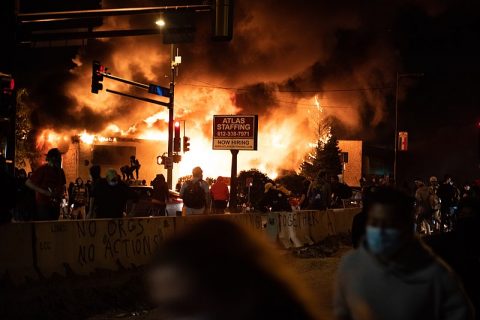
A building burning in Minneapolis following the death of George Floyd.
Photo by Hungryogrephotos via Wikipedia.
One must not exaggerate, of course. We do not yet live under a Soviet-type tyranny in which every university thesis, on no matter how arcane a subject, was obliged by hook or by crook to quote Lenin. It is still possible, though not at all easy, to live as a scholar in our societies outside the university system. But it does not require the tyranny of the complete police state to obtain a high degree of intellectual conformity, as we can now observe at our leisure. Young university academics of my acquaintance in several countries tell me that they are now afraid to speak their mind, not because they would fear for their lives, but fear for their promotion. This is not the same, or as terrible, as fearing for their lives, but it is nonetheless very far from the Millian ideal of freedom of thought and speech.
There is much worse. It is not merely that they must keep their mouth shut and not say what they think, bad enough as this must be for those who have chosen the life of the mind; it is that they must positively subscribe to things that they believe to be bad or false. And this is a mark of totalitarianism. They must subscribe to doctrines they believe absurd, for example by describing in job applications their future efforts to promote diversity, so-called. By making the expression of untruth the condition of employment, probity is destroyed in advance. Those who lack it are easier to control.
Increasingly, social movements do not allow any neutrality with regard to the causes that they promote. Non-adherence is no different from enmity and derogation is evil: if you are not part of the solution you are part of the problem. In vain might you argue that your interest is elsewhere, in the taxonomy of grasshoppers, for example, or in the biochemistry of acorns, or in the bibliography of Alexander Pope: there is one subject that trumps all others in importance, and on it only one opinion is permissible. You must pass a test of loyalty.
The latest of these movements is, of course, Black Lives Matter, and its success in cowing so large a part of the intelligentsia is in a way admirable, a model of political organization for the future, though one much to be feared. By claiming that silence is violence, it has made hand-wringing (to avoid its anathema) the mark, and almost the whole, of virtue. It has successfully reversed Martin Luther King’s goal, such that the colour of a man’s skin is once again more important than the content of his character, and it has made respectable that most Stalino-Maoist of notions, that people should be promoted and rewarded according to their social (in this case, racial) origins. And anyone who disagrees is an Enemy of the People, the word People being here used in a severely technical sense, to mean the arbiters of the allocation of rewards.
August 2, 2020
Words are verbal tools, but tools can be weaponized
In this week’s newsletter, Andrew Sullivan analyzes the roots of wokeness:
In the mid-2010s, a curious new vocabulary began to unspool itself in our media. A data site, storywrangling.org, which measures the frequency of words in news stories, revealed some remarkable shifts. Terms that had previously been almost entirely obscure suddenly became ubiquitous — and an analysis of the New York Times, using these tools, is a useful example. Looking at stories from 1970 to 2018, several terms came out of nowhere in the past few years to reach sudden new heights of repetition and frequency. Here’s a list of the most successful neologisms: non-binary, toxic masculinity, white supremacy, traumatizing, queer, transphobia, whiteness, mansplaining. And here are a few that were rising in frequency in the last decade but only took off in the last few years: triggering, hurtful, gender, stereotypes.
Language changes, and we shouldn’t worry about that. Maybe some of these terms will stick around. But the linguistic changes have occurred so rapidly, and touched so many topics, that it has all the appearance of a top-down re-ordering of language, rather than a slow, organic evolution from below. While the New York Times once had a reputation for being a bit stodgy on linguistic matters, pedantic, precise and slow-to-change, as any paper of record might be, in the last few years, its pages have been flushed with so many neologisms that a reader from, say, a decade ago would have a hard time understanding large swathes of it. And for many of us regular readers, we’ve just gotten used to brand new words popping up suddenly to re-describe something we thought we knew already. We notice a new word, make a brief mental check, and move on with our lives.
But we need to do more than that. We need to understand that all these words have one thing in common: they are products of an esoteric, academic discipline called critical theory, which has gained extraordinary popularity in elite education in the past few decades, and appears to have reached a cultural tipping point in the middle of the 2010s. Most normal people have never heard of this theory — or rather an interlocking web of theories — that is nonetheless changing the very words we speak and write and the very rationale of the institutions integral to liberal democracy.
What we have long needed is an intelligible, intelligent description of this theory which most people can grasp. And we’ve just gotten one: Cynical Theories: How Activist Scholarship Made Everything About Race, Gender and Identity, by former math prof James Lindsay and British academic, Helen Pluckrose. It’s as deep a dive into this often impenetrable philosophy as anyone would want to attempt. But it’s well worth grappling with.
What the book helps the layperson to understand is the evolution of postmodern thought since the 1960s until it became the doctrine of Social Justice today. Beginning as a critique of all grand theories of meaning — from Christianity to Marxism — postmodernism is a project to subvert the intellectual foundations of western culture. The entire concept of reason — whether the Enlightenment version or even the ancient Socratic understanding — is a myth designed to serve the interests of those in power, and therefore deserves to be undermined and “problematized” reason whenever possible. Postmodern theory does so mischievously and irreverently — even as it leaves nothing in reason’s place. The idea of objective truth — even if it is viewed as always somewhat beyond our reach — is abandoned. All we have are narratives, stories, whose meaning is entirely provisional, and can in turn be subverted or problematized.
During the 1980s and 1990s, this somewhat aimless critique of everything hardened into a plan for action. Analyzing how truth was a mere function of power, and then seeing that power used against distinct and oppressed identity groups, led to an understandable desire to do something about it, and to turn this critique into a form of activism. Lindsay and Pluckrose call this “applied postmodernism”, which, in turn, hardened into what we now know as Social Justice.

